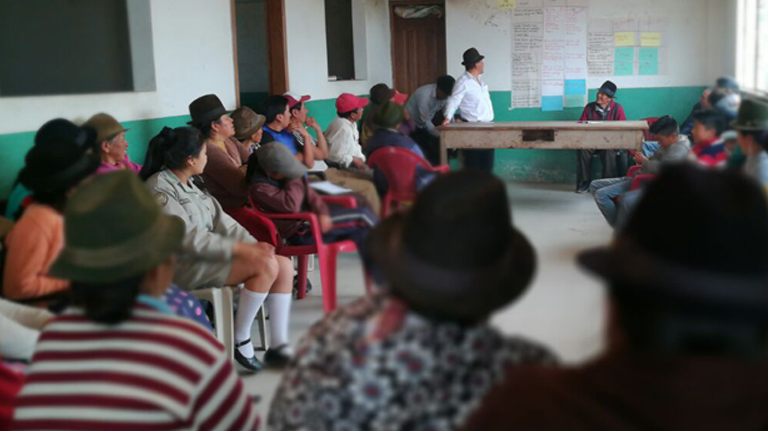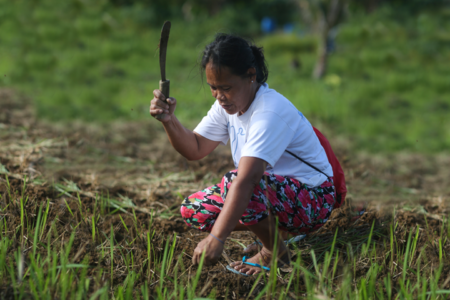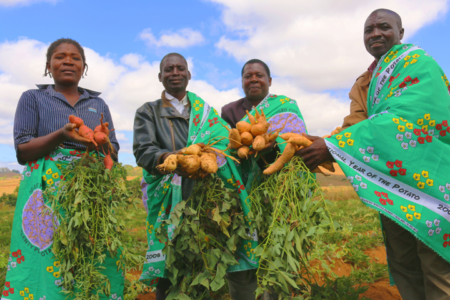
The food security of Andean small-scale potato farmers depends on the quality of their planting materials. Potatoes are susceptible to pathogens and pest accumulation in seed tubers over successive cycles of vegetative propagation, leading to seed degeneration and falling yields. This project aims to improve the resilience of local seed systems by addressing the causes of potato seed degeneration.
Background
The sustainability of potato cultivation in the Andes is highly dependent on maintaining plant health, particularly the quality of the seed tubers. Andean farmers usually use part of their harvest as seed, creating a high risk of potato seed degeneration (PSD). PSD is defined as pathogen and pest accumulation in seed tubers over successive cycles of vegetative propagation. It not only reduces yields, but also renders potato vulnerable to stresses such as adverse climatic conditions. PSD is influenced by biophysical factors—such as variety type, altitude at which it is grown, pest and pathogen incidence and severity— and socio- economic factors—such as consumer and producer preferences and market prices. These biophysical and socioeconomic factors are highly variable in Ecuador’s Andean region, and little is known about how their interaction affects PSD.
Funded by the McKnight Foundation, the project aimed to generate greater understanding and encourage better management of PSD, thus improving potato productivity in the Ecuadorian Andes. It also contributed useful knowledge on building more resilient seed systems in other tropical highlands.
The results could help researchers to design a functional ‘integrated seed health strategy’ for the management of PSD, combining host plant resistance and on-farm management practices with the use of high-quality seed.
Objectives
- To strengthen research capacity to study potato seed systems in the Andes.
- To generate greater understanding of how biophysical and socio-economic factors affect PSD.
Approach
The project built the research capacities of a PhD student (Israel Navarrete) and selected Ecuadorian farmers to collect and analyze data. Scientists involved in this project characterized the seed systems of the main potato-producing areas in the province of Cotopaxi, Ecuador, investigated the main drivers of PSD at farm level and identified traditional and improved practices for managing PSD. The project used the multi-stakeholder framework for intervening in RTBs to guide different activities including rapid appraisal, formal surveys and fact-finding workshops. The project also used the SeedHealth model to simulate seed degeneration to identify promising practices to manage PSD.
The project used data from seed lot studies and surveys to gain insights on the effects of biophysical drivers on PSD
under experimental and farmers conditions. Through focus group discussions and interviews, scientists involved in this
project identify farmers’ current seed sources, practices for managing PSD, and relevant social factors that could have an effect on seed management and seed health.
This project also collaborated closely with Wageningen University and national research institutions such as the Instituto Nacional de Investigaciones Agropecuarias (INIAP), Universidad Técnica de Cotopaxi (UTC), and local farmer associations to assure the evidence would contribute to the decision making of different stakeholders to design improved seed interventions.
Outcomes
The PhD student successfully submitted his dissertation at Wageningen University and his research chapters are in the process of submission to peer review journals.
The project also trained seven BSc Ecuadorian students, one BSc student from Germany, and one MSc from China. These students learned from each other by creating a study group where they could ask questions and find options to overcome challenges in their research projects.
One hundred and fifty-three farmers participated in training activities and discussions sessions to understand how their potato seed systems work and how diseases transmit in/on the seed and spread over geographical areas.
Three farmers’ organizations participated in the pilot of a new participatory methodology called “Farmers Research Network” (FRN). This methodology aims to strengthen farmers’ capacities to do research on topics of interest to farmers while exchanging information with other groups about their insights and challenges. Using this methodology, the project attempted to motivate farmers to investigate their agricultural problems and propose their own solutions.
The project also strengthened the capacities of 311 scientists, extension agents, and technicians on the importance of local potato seed systems, and the spreading of pests and diseases on the seed.
The project contributed to raising awareness among different potato stakeholders about the potential impact of purple top in the páramos (a fragile ecosystem located above the tree line). It also raised awareness about the importance of collaboration between multiple stakeholders to manage purple top disease and the potato psyllid in Ecuador.
The project developed different tools, such as a digital dashboard, to better understand the presence of purple top disease and the potato psyllid in Ecuador. This dashboard is open access to farmers and researchers alike.
Achievements
One of the biggest achievements of the project was the creation of a strong network of collaborations with national and international institutions (including farmers organizations), and the Community of Practice of the Andes, which includes CIP, the McKnight Foundation, INIAP, and the NGO Statistics for Sustainable Development. Building this network proved fruitful for implementing activities, generating collaborative publications, and cross-pollinating knowledge among the groups.
Good partnerships with local stakeholders have led to the establishment of working groups to monitor significant emerging threats to potato production, such as potato purple top disease and the potato psyllid (Bactericera cockerlli), both of which cause great economic loss through substantially reduced tuber yield and quality.
The project identified five key messages about potato seed degeneration in the tropical highlands of Ecuador:
- The management of purple top disease and the potato psyllid in Ecuador depends on different factors that require the engagement of different stakeholders.
- Agroecological conditions and the reuse of potato seed partially explain seed degeneration.
- Varieties and local on-farm management practices play an important role on seed degeneration.
- Farmers respond to potato seed degeneration, but their seed replacement practice are influenced by their income rather than their perception of seed degeneration.
- It is important to understand how potato seed degeneration results from the complex interaction between socioeconomic conditions, agroecological conditions, farmers management practices, and potato varieties under farmers’ conditions.
Key outputs
| Outcomes | Target number | Actual |
| Farmers with improved capacity to collect and analyze data | 100 | 153 |
| University students with improved capacity to perform research and understand local potato seed systems | NA | 10 |
| Scientists, technicians and extension workers with improved capacity to adapt seed health strategy to local conditions | 30 | 311 |
Contact
Jorge Andrade-Piedra
CIP, Peru
j.andrade@cgiar.org
Thanks to our donors



